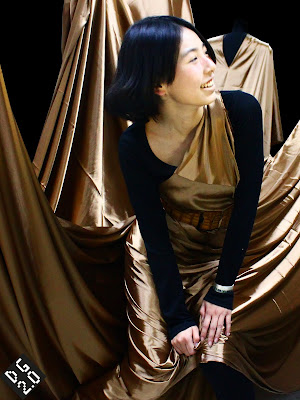Below you can read the introductions about the four capsule collections showcased at the first exhibition in Shanghai, by four different designer.
Skura
This collection gets inspiration by the wood window shutter, and a memory of simple daily life gesture.
A piece of wood without extra decoration and ornaments [sakura] reflects on us mood of joy, sadness and excitements. From all this feeling he develop this collection.
Light flown dresses, pleated skirts, and tops in silk in combination with light woolen coats make the collection. The color combination is in the shades of gray with accent on washed pink, green tones, and mustard color.
African wildlife.
All the collection is focus on the icon of the Lion, the king of the jungle.
The lion is wild and strong yet it gives protection to his family; it is a perfect symbol that represents hardness and softness at the same time.
This is an ideal representation of the relationship between young men and women.
The garment fittings are all oversize to bring the grand feeling from the lion. The combination of fur, wool and leather make this collection warm, soft and hard at the same time.
Contact the designer: Allisa Vallentine
Glamour China.
China has a real impact on his creation; the daily environment, the juxtaposition of western and eastern culture, the contradiction of a developing country are a constant source of inspiration.
The results of this process and analysis are glamorous dresses covered of gold sequins mixed with rough and rustic element of the daily life, like old customized military coat.
Contact the designer: Tom Eloi Gobles
闻
All his collection his inspired by Confucius word 闻.
This word has different kind of meaning. If you read it as a verb it means
“to smell / to hear”, but as an adjective is
“famous / well know”.
Often overlooked in Confucian ethics are the virtues to the self, namely sincerity and the cultivation of knowledge. Virtuous action towards others begins with virtuous and sincere thought, which begins with knowledge.
Contact the designer: 1900 (杨树)









































